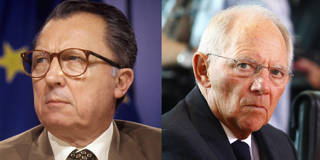Of all European politicians who never led their countries, Jacques Delors and Wolfgang Schäuble had the greatest impact on Europe. Between them, the two men, who passed away within a day of each other in December, shaped today’s European Union, warts and all.
ATHENS – Of all European politicians who never led their countries, Jacques Delors and Wolfgang Schäuble had the greatest impact on Europe. Between them, Delors and Schäuble, who died within a day of each other in December, shaped today’s European Union, warts and all. Their tenures did not really overlap, but their bitter clashes over the future of Europe made history. And while the significance of both men is widely recognized, the strong causal link between their conflicting visions and the EU’s current slump is not well understood.
Judging by the various obituaries, the two men are remembered for their ostensible differences: Delors, the flamboyant French, Roman Catholic, social democrat whose dream of a Keynesian Europe was British Prime Minister Margaret Thatcher’s nightmare; and Schäuble, the austere German lawyer whose fiscal Calvinism terrified deficit-spending southern European, as well as French, finance ministers. While both have been acknowledged as noteworthy Europeans, and thus foes of Euroskeptics, Delors is portrayed as the more impatient centralizer, in sharp contrast to Schäuble, who was reluctant to cede the German parliament’s powers to Brussels.
None of this is false. But the portrayal of the two men’s motivations and deeds it leaves us with is incomplete – and possibly misleading.

ATHENS – Of all European politicians who never led their countries, Jacques Delors and Wolfgang Schäuble had the greatest impact on Europe. Between them, Delors and Schäuble, who died within a day of each other in December, shaped today’s European Union, warts and all. Their tenures did not really overlap, but their bitter clashes over the future of Europe made history. And while the significance of both men is widely recognized, the strong causal link between their conflicting visions and the EU’s current slump is not well understood.
Judging by the various obituaries, the two men are remembered for their ostensible differences: Delors, the flamboyant French, Roman Catholic, social democrat whose dream of a Keynesian Europe was British Prime Minister Margaret Thatcher’s nightmare; and Schäuble, the austere German lawyer whose fiscal Calvinism terrified deficit-spending southern European, as well as French, finance ministers. While both have been acknowledged as noteworthy Europeans, and thus foes of Euroskeptics, Delors is portrayed as the more impatient centralizer, in sharp contrast to Schäuble, who was reluctant to cede the German parliament’s powers to Brussels.
None of this is false. But the portrayal of the two men’s motivations and deeds it leaves us with is incomplete – and possibly misleading.